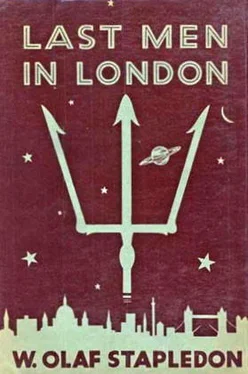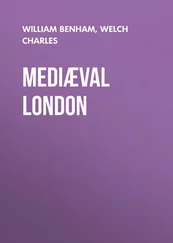This middle world had already spread outwards to become a vague expanse of countries, embracing somewhere beyond the familiar streets all kinds of wonders, which were nevertheless definitely day-time wonders. Somewhere there was India, full of tigers, elephants, jewelled princes, and jugglers. Elsewhere lay Iceland, all solid ice, with rivers of fire running down the crystal volcanoes. Then there was France, where they ate frogs and snails and were terribly polite; Germany, where they made cheap copies of English toys, and fought duels; Greece, where they wore no clothes except helmets with clothes-brushes on them; Egypt, all mummies and crocodiles; Fairyland, where magic happened more easily than in England. Yet even in England, magic was not unknown. There was Santa Claus, and dozens of lucky and unlucky things to be sought and avoided.
Over the whole world of countries hung the sky, a blue or cloudy ceiling. Here a discrepancy entered into Paul’s universe. If you thought about it from the day-time point of view, you believed that beyond the sky and the stars there was heaven, full of winged angels in nightgowns, their eyes always turned upwards. And above them again was God, whom Paul had somehow come to think of as a huge grown-up, sprawling from horizon to horizon, and looking down precisely at Paul, with eyes that saw even his thoughts. Somehow those eyes were the same as the Eye that stared at him in the nether darkness of his bedroom. When Paul remembered the Eye by day, he would repeat rapidly, ‘Oh God, I love you, I love you, I love you.’
But if you thought of things from the point of view of the starry night, God and the angels did not seem to fit in very well. Paul half believed that they were pictures painted on the ceiling of the day world.
In time, of course, Paul’s day world ceased to be flat, and became a huge ball. At this stage the universe was more like a dumpling than a sandwich. Vaguely Paul still conceived the three levels of existence. The nether night was deep down within the ball of the day world. The starry night was all around it. On the ball were all the countries except Fairyland, which was nowhere. Many of the countries were British Possessions, and red. At school he learned much about England and the Empire, and became a patriot. The English were—well, English. They had the greatest empire in the world. They were the only people who played fair in games, and were kind to animals, and could govern black people, and fight a losing battle to the end, and rule the seas. And because they were such fine people, God had hidden a lot of coal and iron under their country, so that they could use it for ships and engines and for making thousands of things that other countries were not clever enough to make for themselves. God had also written the Bible in English, because it was the best language, and the angels talked it.
Paul’s patriotism was largely an affectation. At this time he had a great longing to be like his fellows, and his fellows made it very obvious that they were patriotic. Also he found in patriotism a source of self-gratulation. Somehow or other, through patriotism, the worm that was the ordinary Paul became one of the lords of the earth. But there was also another factor at work. He had already begun to feel an obscure impulse to devote himself to ends beyond private gratification. Much of this sadly misconceived yearning for lofty ends was expressed in bragging about his school and vilifying other schools; but the Empire afforded it a more imposing object.
3. EARLY EXPERIMENTS ON PAUL
Not until Paul was already at school did I begin to exercise a deliberate influence over him. My aim was to prepare him to attain in early maturity as complete an insight as possible into the Neptunian view of Terrestrial affairs. In his early years I seldom influenced him, but the rare occasions on which I did so had a deep effect on him. They were designed to intensify his consciousness beyond the normal limitations of his species. By goading and delicately controlling his attention I contrived to make him startlingly aware, now and again, of data which commonly lie beyond the apprehension of the First Men. The scope of my early work upon him might be described by saying that I forced him to a more vivid sense of the reality and uniqueness of perceptual objects, of himself, of others as selves, and also of his own underlying unity with others, and of his own participation in the cosmos.
For instance, to deal with the simplest matter first, Paul once found a curious green pebble. He picked it up and examined it intently, noting with delight its veining, its smooth curvature, its rigidity. He turned it about, fingered it, tapped it. Then suddenly I flooded him with a spate of relevant imagery, visual and tactual, so that he seemed to encounter in this one pebble the whole splendour of sight, the whole poignancy of touch. The thing suddenly leapt at him with its unveiled reality. The change in his experience was as impressive as the change from imagery to actual perception, from picturing a friend’s face to actually seeing it. It was as though the earlier experience, which at the time seemed normally vivid, had been after all but a shadowy imagination of a pebble, compared with the later experience, which was an actual apprehension of an objective reality. It was over in a moment. Paul dropped the pebble and collapsed on the grass, holding his head in his hands. For a moment he thought someone had thrown a pebble at him and that it had gone right through his head. He opened his eyes. Everything seemed ordinary again. Then he caught sight of the pebble, half-hidden under a dandelion leaf. It was just a little round green thing, but it seemed to look at him meaningly. As they regarded one another, Paul and the pebble, Paul felt the pebble rushing at him again. He covered his eyes and sat for a long while thinking of nothing but his splitting head. He had been rather badly hurt, but also he was intrigued. The effect was something like his forgotten experience of birth, a confusion of shock, pain, brilliant novelty, fear of the unknown, and exhilaration.
Paul spent the next two days in bed with a ‘bilious headache’. When he was recovered, he went in search of his pebble. He picked it up almost as though it were a live bomb, but though it raised a vivid memory of the adventure, it gave him no fresh experience.
I repeated this experiment on Paul at rare intervals and in relation to very diverse objects, such as his precious knife, the tolling of a bell, a flying hawk, and his own hand. The last entailed a whole week in bed, for not only had he perceived his hand externally as he had perceived the pebble, he had also perceived it from within; and moreover he had been fascinated by his volitional control of it. It was a little grubby brown hand with black-rimmed nails and many scratches. He turned it about, bending and straightening the fingers, confidently willing it to perform various antics, intensely aware of his own fiat, yet not at all self-conscious in any deeper sense.
Through my influence Paul continued to suffer these experiences throughout his childhood. He became accustomed to them, and to look forward to them with mingled dread and zest. At length I judged him ripe for a different kind of experiment. He had been coveting a minute bronze dog which belonged to one of his companions. He tried to persuade the owner to ‘swop’ it, but in vain. Paul became more and more obsessed, and finally stole the dog. While he was guiltily playing with it in his own house I played a trick on him. I gave him an intense and detailed visual image of his friend rummaging frantically among his toys for the lost dog. So aggressive did this image become that it blotted out Paul’s actual environment. It had, moreover, the intensified reality that he had first encountered in the pebble. Paul’s reaction was strange. For a moment he stared at the hallucination, while hatred welled within him. Then, as soon as the vision had faded, he rushed into the street and dropped the little bronze figure down a grid. Henceforth he treated his former friend with shocking spite, mingled with terror.
Читать дальше












